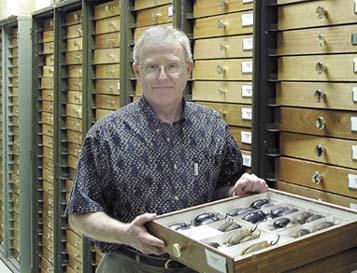 One of the 2001 ORCA recipients, Brett Ratcliffe is curator of
insects
at the NU State Museum. One of the 2001 ORCA recipients, Brett Ratcliffe is curator of
insects
at the NU State Museum.
Ratcliffe Developed Interest for Insects as a
Youngster
Team Scarab Fights to Restore
Biodiversity
By Tom Simons, Public Relations
It probably would not have come as a surprise to any of Brett
Ratcliffe's
childhood friends that he would one day be the curator of the
fourth-largest
scarab beetle collection in the world.
After all, he started collecting insects as a boy in Georgia 45 years
ago. At first it was only a hobby, but insects soon became his passion
after
he moved with his family to Japan at the age of 12.
"In Japan all kids collect insects, like all American kids play
baseball," said Ratcliffe, who lived in Japan for four years while
his Air Force father was stationed there. "There was this huge
infrastructure
there for insect study. Imagine going to a Younkers or a Dillard's and
finding
entomology departments where you can buy supplies and equipment and
books.
They do that in Japan and it just fired me up. The camaraderie I had with
friends for collecting insects over there - and the competition to get a
bug nobody else had - was wonderful."
Ratcliffe started out collecting beetles, butterflies and moths, but
soon became overwhelmed by their diversity. He narrowed his pursuit to
scarab
beetles, butterflies and moths, but still couldn't keep up and when his
family moved back to the United States, he decided to cut out the
butterflies
and moths.
"I was left with the scarab beetles, and that's still too
many,"
he said. "For example, there are only 4,000 species of mammals in
the
world. Among scarab beetles alone - one family of beetles - there are
35,000
species."
Scarab beetles are generally compact, heavy-bodied insects that range
in size from a grain of rice to the 8-inch-long Hercules beetle. A few
species
are considered agricultural pests, but others are vital in pollination
and
in breaking down organic matter, thus fertilizing the soil.
Scarabs also led Ratcliffe into a career in which he gets paid to do
the thing he loves best - studying insects.
Curator of insects and professor of entomology at the University of
Nebraska
State Museum, Ratcliffe has been a member of the Nebraska faculty since
1970. He has traveled to the tropics at least once a year for the last 28
years, collecting scarabs in lowland rain forests and highland cloud
forests,
and he took a two-year leave-of-absence from UNL from 1976 to 1978 to
work
in Brazil's Amazon basin.
Largely because of his collecting expeditions, the NU State Museum had
already built a very strong scarab collection when in 1999 the
Smithsonian
Institution transferred, for at least 10 years, nearly all of its vast
scarab
collection to the Nebraska Hall laboratory directed by Ratcliffe and his
associate, Mary Liz Jameson. Only the British Museum of Natural History
in London, the National Museum of Natural History in Paris and the Museum
of Nature in Berlin have larger scarab collections than the one Ratcliffe
and Jameson now oversee.
The collection arrived following the NU State Museum entomologists'
success
in securing a five-year, $740,000 National Science Foundation grant in
1997
to study New World beetles and train graduate students in taxonomy. That
grant is paired with a $380,000 NSF biotic surveys and inventories grant
under which they will attempt to document completely the dynastine
scarabs
of Central America.
The grants have allowed Nebraska's "Team Scarab" -
Ratcliffe,
Jameson and four graduate students - to produce a tremendous amount of
what
Ratcliffe terms "product." In the last 3 1/2 years, Team Scarab
has published 47 papers in academic journals, produced 25 Web
publications,
made 31 research presentations, secured more than two dozen small grants
and made four research expeditions.
That recent productivity and a career that has produced three books
and
more than 80 refereed journal articles earned Ratcliffe recognition this
spring as one of two systemwide winners (with UNL history professor Gary
Moulton) of the University of Nebraska's Outstanding Research and
Creative
Activity Awards.
"The ORCA award is really the result of the productivity of all
the people in our lab, not just me," Ratcliffe said. "It's been
a wonderful, synergistic effort and it's unfortunate that one person has
to get singled out instead of our laboratory being singled out, which
would
be better. Mary Liz and I are very proud of our students."
Team Scarab's graduate students hail from Argentina, Canada, Ecuador
and Guatemala, and Ratcliffe said he hopes they will go on to be
effective
spokespersons for biodiversity in their home countries. He said that's
especially
needed in the tropics where wholesale destruction of rain forests is
taking
place as humans move into previously pristine wilderness areas seeking
timber
products, minerals and metals and new areas for cattle ranches.
"We have a sense of urgency about what we're doing because so
many
of these habitats are being 'developed,' which means destroyed, for
cattle
farms or other short-term gains," Ratcliffe said. "Forests that
we used to go to 15 or 20 years ago don't exist anymore. It's just
terrible
seeing that horrible loss of biodiversity.
"If we can make people understand, not just the consumer here in
North America, but also the policymakers in Latin America, how much
long-term
gain there is to be had in sustaining their forests, compared to the
short-term
gain from timber products or cattle ranched that are only good for three
years, then that's going to be better for the health of the world's
ecosystems
- and for their economies. But the juggernaut of development is
proceeding
so rapidly, it's a constant uphill battle."
May 5 Commencement Features Former NU Prof
Miller
By Annette Wetzel, Public Relations
James E. Miller, Jr., the Helen A. Regenstein Professor of Literature
Emeritus, at the University of Chicago, will give the address at the UNL
commencement exercises, which begin at 9:30 a.m. May 5 in the Bob Devaney
Sports Center. Chancellor Harvey Perlman will preside over the ceremony.
Approximately 1,900 students will receive degrees.
Miller is a renowned scholar of American literature and has a special
expertise in the writings of Walt Whitman, F. Scott Fitzgerald, Henry
James
and J.D. Salinger. Miller was chairman of the department of English for
the University of Nebraska in the late 1950s and early 1960s. In addition
to delivering the commencement address, Miller will receive an honorary
doctorate degree of letters.
Miller was president of the National Council of Teachers of English,
and has received the Walt Whitman award from the Poetry Society of
America
and the Distinguished Service Award from the National Council of Teachers
of English. Miller holds a Bachelor of Arts degree from the University of
Oklahoma, a Master of Arts degree from the University of Chicago and a
Ph.D.
from the University of Chicago.
Dr. Jerald Schenken of Omaha will receive the Builders Award,
conferred
by the NU Board of Regents for service to the state and university.
Schenken
joined UNMC in 1965 as a pathology instructor and later became an
associate
professor. Since the mid 1970s, he has been a volunteer clinical
professor
in the UNMC College of Medicine and the School of Allied Health
Professions.
Schenken was the president of the Pathology Center based at Methodist
Hospital
in Omaha from 1981until 1996. He has served on numerous editorial boards
and state and national organizations.
The Nebraska Alumni Association will honor three members of the Alumni
Association at the Saturday Commencement.
The distinguished service award will be given to Steve Hauff, Don
Moeller
and Paul Swanson. The award was established in 1940 to recognize members
who have a record of distinguished service to the association.
Hauff of Sioux Falls, S.D., is the president and treasurer of Dakota
Sports, Inc., a company he founded in 1970. Moeller, of Golden, Colo.,
has
has been an active board member of the Coloradans for Nebraska alumni
chapter
since 1991 and was the group's president in 1997-98. Swanson, a retired
dentist in Redlands, Calif., has been a member of the Californians for
Nebraska
chapter since 1963 and was the group's president from 1994-96.
A drop-off area for graduates and mobility restricted guests will be
available on the south side of the Bob Devaney Sports Center. Sign
language
interpreters for hearing impaired individuals will be provided on screen
by HuskerVision. Reserved seats for guests who are ambulatory restricted
will be available in the north and south sides of the arena. Guests in
wheelchairs
will be seated on the northeast corner of the arena floor. Golf carts
will
be located at the ramps on the exterior north and south sides of the
Devaney
Center to assist disabled guests entering and leaving the sports center.
Tickets are not required and admission is free.
EU Visit Could Lead to Greater
Opportunities
for Students, Faculty
By Tom Simons Public Relations
Increased international opportunities for UNL faculty and students -
as well as greater collaboration with other Big 12 Conference schools -
could be the result of a trip taken this spring by Richard Edwards,
senior
vice chancellor for academic affairs, and four other Big 12 provosts to
European Union headquarters in Brussels, Belgium.
Edwards and his colleagues met with EU officials on subjects ranging
from opportunities for Big 12 scientists to visit laboratories in EU
countries,
to immigration policy, student exchanges and health and environmental
problems.
"The trip had two purposes," Edwards said. "One was to
foster greater cooperation among the Big 12 schools in developing
academic
programs and other opportunities for students that will enhance the
offerings
available at each individual institution.
"The second purpose was to see what possibilities there are for
greater exposure to and cooperation with the European Union and its
various
research and exchange opportunities. I think there are good possibilities
in all those areas."
One early possibility may be speaking tours of Big 12 campuses by EU
leaders and scholars. In fact, the five provosts discussed the
possibility
of such a tour during a meeting with Nobel Peace Prize Laureate John Hume
of Northern Ireland.
Edwards said he's encouraged by the potential for Big 12 schools to
build
on existing cooperative efforts such as the Faculty Fellowship Program
that
allows faculty members to spend time at other Big 12 campuses. It's also
unusual, he said, for members of an athletic conference to try to build
such collaborative efforts in the academic arena.
"I think you're going to see more of this as we try to develop
new
ways to support programs that we just couldn't afford or wouldn't be an
appropriate priority if we were trying to do it for one campus,"
Edwards
said. "It provides the opportunity for us to take advantage of the
strengths of the other Big 12 campuses and to share our strengths with
them."
Other Big 12 provosts who accompanied Edwards to Brussels March 29-30
were Brady Deaton of Missouri, Ronald Douglas of Texas A&M, Sheldon
Ekland-Olson of Texas and Marvin Keener of Oklahoma State. | 
